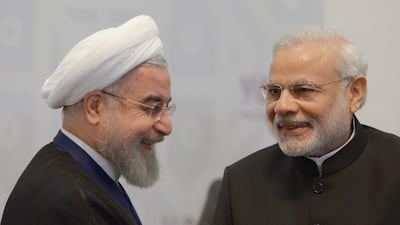NEW DELHI // A century and a half ago India was the prize in the “Great Game” in which Great Britain vied for control of Central Asia to restrict Russia’s access to the subcontinent. Now, India itself has its eye on Central Asia, drawn by the region’s energy resources and boosted by the imminent lifting of sanctions on Iran.
Prime minister Narendra Modi conducted a whirlwind eight-day tour of Central Asia last month, visiting Uzbekistan, Kazakhstan, Turkmenistan, Kyrgyzstan and Tajikistan, with a stopover in Russia. He returned home with a deal to buy uranium from Kazakhstan and an agreement to expedite work on a gas pipeline from Turkmenistan to India.
But with access to Central Asia blocked by China and Pakistan, good relations with Iran are key to India tapping the region’s potential.
At a meeting in New Delhi last week, Mr Modi reiterated to Iranian foreign minister Mohammad Javad Zarif that “India attached high priority to its relations with Iran”, and accepted an invitation to visit Teheran.
"Iran can play an extremely important role in world affairs, especially now that it's not on the road to nuclear weapons," said Vikas Swarup, spokesman for India's external affairs ministry. With its vast energy needs, India will need to tap Iran's oil reserves, he told The National.
India continued to import oil from Iran over the past decade despite sanctions over Tehran’s nuclear programme. However, from being the second-biggest supplier six years ago, providing between 14 and 17 per cent of India’s oil imports, Iran has fallen to seventh place now, providing only 6 per cent.
“India and Iran have faced problems in payment for oil purchases” because of the sanctions, said Gauri Khandekar, deputy director of the Global Relations Forum, a Brussels-based think tank. “This has created tensions in the partnership. Now this will change.”
Iran is keen on working with India as well. An Iranian diplomat told Bloomberg recently that his country would seek billions of dollars in infrastructure investment from India. One example is the Iranian port of Chabahar, on the Arabian Sea. “Two Indian state-run companies – Jawaharlal Nehru Port Trust and Kandla Port Trust – have plans to invest $85 million [Dh312m] to upgrade two berths,” Bloomberg reported.
But India must move quickly, said Kabir Taneja, a scholar at the Oslo-based Fritdjof Nansen Institute. After the lifting of sanctions, companies and countries will be queuing up to repair economic relations with Iran.
Mr Taneja mentioned Iran’s Farzad B gas field in the Arabian Gulf, discovered by India’s Oil and Natural Gas Corporation Videsh Ltd in 2008. Although a 2002 agreement gave an Indian consortium permission to develop the entire Farzad field, India has so far invested only in further exploration rather than on extracting gas.
"With sanctions lifting, if India does not commit money to develop the field, Iran could, as it has threatened in the past, open the field to international bidding," Mr Taneja told The National. "If this happens, there is very little chance for Indian companies to successfully compete with global oil and gas majors such as Shell or ExxonMobil."
The Indian foreign secretary S Jaishankar last month spelt out another reason Iran is important to New Delhi.
“Iran can offer us an alternative route to Central Asia,” he said at a lecture in Singapore.
The six Central Asian nations – Afghanistan, Uzbekistan, Kazakhstan, Turkmenistan, Kyrgyzstan and Tajikistan – hold roughly one tenth of the world’s natural gas reserves, as well as large oil and coal deposits, according to British Petroleum.
But India’s access to this region is blocked by China and Pakistan.
China is India’s rival in the new Great Game in Central Asia, but India finds itself far outstripped in this contest.
Some published estimates claim that China controls about a third of Central Asian oil and gas reserves. Turkmenistan exports nearly 80 per cent of its natural gas to China. Two years ago, Kazakhstan chose China over India when it sold a stake in its Kashagan oil field in the Caspian Sea.
The Kashagan case is “a cold reminder of how far Beijing has managed to build inroads in Central Asian governments”, Mr Taneja said. China’s assertiveness in the region “is today next to impossible for India to realistically counter”.
Pakistan, for its part, has steadfastly refused to allow transhipment from Central Asia through to India. Longstanding plans to build gas pipelines to India from Turkmenistan and Iran have stalled because of a lack of Pakistani cooperation.
For this reason, India will look to take the roundabout route for energy imports from Central Asia – overland to the Iranian port of Chabahar and then across the Arabian Sea.
But Mr Modi will have to act fast.
“Good relations with Iran, and development of good commercial and political assets in Iran gives India leverage both in Central Asia and Afghanistan,” Mr Taneja said. “However, all these diplomatic manoeuvres are going to be needed in the very near future for them to be fruitful in years to come.”
ssubramanian@thenational.ae

